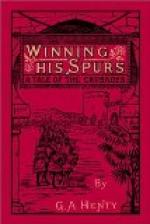Another two days’ journey brought them to the foot of the steep ascent, and here they hired the services of a guide. The ascent was long and difficult, and in spite of the praises which the host had bestowed upon the road, it was so steep that Cuthbert was, for the most part, obliged to walk, leading his steed, whose feet slipped on the smooth rock, and as in many places a false step would have thrown them down many hundreds of feet into the valley below, Cuthbert judged it safer to trust himself to his own feet. He disencumbered himself of his helmet and gorget, and placed these upon the horse’s back. At nightfall they had attained a very considerable height, and stopped at one of the small refuges of which the landlord had spoken.
“I like not the look of the weather,” the guide said in the morning—at least that was what Cuthbert judged him to say, for he could speak no word of the man’s language. His actions, however, as he looked towards the sky, and shook his head, spoke for themselves, and Cuthbert, feeling his own powerlessness in a situation so novel to him, felt serious misgivings at the prospect.
The scenery was now very wild. On all sides crags and mountain tops covered with snow glistened in the sun. The woods near the path were free of snow; but higher up they rose black above the white ground. The wind blew keenly, and all rejoiced in the warm cloaks which they had obtained; for even with the protection of these they had found the cold bitter during the night.
“I like not this country,” Cnut said. “We grumbled at the heat of Palestine, but I had rather march across the sand there than in this inhospitable frozen region. The woods look as if they might contain spectres. There is a silence which seems to be unnatural, and my courage, like the warmth of my body, is methinks oozing out from my fingers.”
Cuthbert laughed.
“I have no doubt that your courage would come again much quicker than the warmth, Cnut, if there were any occasion for it. A brisk walk will set you all right again, and banish these uneasy fancies. To-night we shall be at the highest point, and to-morrow begin to descend towards Germany.”
All day the men kept steadily on. The guide from time to time looked apprehensively at the sky; and although in the earlier part of the day Cuthbert’s inexperienced eye saw nothing to cause the slightest uneasiness, towards the afternoon the scene changed. Light clouds began to gather on the top of all the hills and to shut the mountain peaks entirely from view. The wind moaned between the gorges and occasionally swept along in such sudden gusts that they could with difficulty retain their feet. The sky became gradually overcast, and frequently light specks of snow, so small as to be scarcely perceptible, were driven along on the blast, making their faces smart by the force with which they struck them.
“It scarcely needs our guide’s face,” Cuthbert said, “to tell us that a storm is at hand, and that our position is a dangerous one. As for me, I own that I feel better pleased now that the wind is blowing, and the silence is broken, than at the dead stillness which prevailed this morning. After all, methinks that a snowstorm cannot be more dreaded than a sandstorm, and we have faced those before now.”




